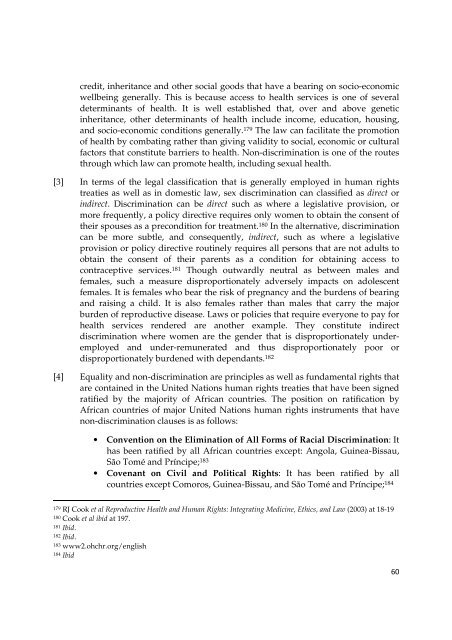sexual health and human rights in the african region - The ICHRP
sexual health and human rights in the african region - The ICHRP
sexual health and human rights in the african region - The ICHRP
Create successful ePaper yourself
Turn your PDF publications into a flip-book with our unique Google optimized e-Paper software.
credit, <strong>in</strong>heritance <strong>and</strong> o<strong>the</strong>r social goods that have a bear<strong>in</strong>g on socio-economic<br />
wellbe<strong>in</strong>g generally. This is because access to <strong>health</strong> services is one of several<br />
determ<strong>in</strong>ants of <strong>health</strong>. It is well established that, over <strong>and</strong> above genetic<br />
<strong>in</strong>heritance, o<strong>the</strong>r determ<strong>in</strong>ants of <strong>health</strong> <strong>in</strong>clude <strong>in</strong>come, education, hous<strong>in</strong>g,<br />
<strong>and</strong> socio-economic conditions generally. 179 <strong>The</strong> law can facilitate <strong>the</strong> promotion<br />
of <strong>health</strong> by combat<strong>in</strong>g ra<strong>the</strong>r than giv<strong>in</strong>g validity to social, economic or cultural<br />
factors that constitute barriers to <strong>health</strong>. Non-discrim<strong>in</strong>ation is one of <strong>the</strong> routes<br />
through which law can promote <strong>health</strong>, <strong>in</strong>clud<strong>in</strong>g <strong>sexual</strong> <strong>health</strong>.<br />
[3] In terms of <strong>the</strong> legal classification that is generally employed <strong>in</strong> <strong>human</strong> <strong>rights</strong><br />
treaties as well as <strong>in</strong> domestic law, sex discrim<strong>in</strong>ation can classified as direct or<br />
<strong>in</strong>direct. Discrim<strong>in</strong>ation can be direct such as where a legislative provision, or<br />
more frequently, a policy directive requires only women to obta<strong>in</strong> <strong>the</strong> consent of<br />
<strong>the</strong>ir spouses as a precondition for treatment. 180 In <strong>the</strong> alternative, discrim<strong>in</strong>ation<br />
can be more subtle, <strong>and</strong> consequently, <strong>in</strong>direct, such as where a legislative<br />
provision or policy directive rout<strong>in</strong>ely requires all persons that are not adults to<br />
obta<strong>in</strong> <strong>the</strong> consent of <strong>the</strong>ir parents as a condition for obta<strong>in</strong><strong>in</strong>g access to<br />
contraceptive services. 181 Though outwardly neutral as between males <strong>and</strong><br />
females, such a measure disproportionately adversely impacts on adolescent<br />
females. It is females who bear <strong>the</strong> risk of pregnancy <strong>and</strong> <strong>the</strong> burdens of bear<strong>in</strong>g<br />
<strong>and</strong> rais<strong>in</strong>g a child. It is also females ra<strong>the</strong>r than males that carry <strong>the</strong> major<br />
burden of reproductive disease. Laws or policies that require everyone to pay for<br />
<strong>health</strong> services rendered are ano<strong>the</strong>r example. <strong>The</strong>y constitute <strong>in</strong>direct<br />
discrim<strong>in</strong>ation where women are <strong>the</strong> gender that is disproportionately underemployed<br />
<strong>and</strong> under-remunerated <strong>and</strong> thus disproportionately poor or<br />
disproportionately burdened with dependants. 182<br />
[4] Equality <strong>and</strong> non-discrim<strong>in</strong>ation are pr<strong>in</strong>ciples as well as fundamental <strong>rights</strong> that<br />
are conta<strong>in</strong>ed <strong>in</strong> <strong>the</strong> United Nations <strong>human</strong> <strong>rights</strong> treaties that have been signed<br />
ratified by <strong>the</strong> majority of African countries. <strong>The</strong> position on ratification by<br />
African countries of major United Nations <strong>human</strong> <strong>rights</strong> <strong>in</strong>struments that have<br />
non-discrim<strong>in</strong>ation clauses is as follows:<br />
• Convention on <strong>the</strong> Elim<strong>in</strong>ation of All Forms of Racial Discrim<strong>in</strong>ation: It<br />
has been ratified by all African countries except: Angola, Gu<strong>in</strong>ea-Bissau,<br />
São Tomé <strong>and</strong> Príncipe; 183<br />
• Covenant on Civil <strong>and</strong> Political Rights: It has been ratified by all<br />
countries except Comoros, Gu<strong>in</strong>ea-Bissau, <strong>and</strong> São Tomé <strong>and</strong> Príncipe; 184<br />
179 RJ Cook et al Reproductive Health <strong>and</strong> Human Rights: Integrat<strong>in</strong>g Medic<strong>in</strong>e, Ethics, <strong>and</strong> Law (2003) at 18-19<br />
180 Cook et al ibid at 197.<br />
181 Ibid.<br />
182 Ibid.<br />
183 www2.ohchr.org/english<br />
184 Ibid<br />
60
















